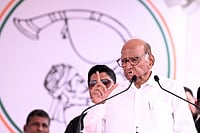The Supreme Court directed the Centre on Thursday to set up a fresh delimitation commission for ensuring a proportional representation of the communities specified as Scheduled Castes (SCs) and Scheduled Tribes (STs), as mandated under the Constitution.
While asking the Centre to set up the delimitation panel, the top court, however, said it cannot direct Parliament to amend or make laws for giving proper representation to other communities that form part of the STs as that would amount to "venturing into the legislative domain".
"For the court to direct that in addition to the reservation made ... Parliament must legislate to enact proportional representation for all other communities forming part of Scheduled Tribes, that would be venturing into the legislative domain," it said.
The directions were issued by a bench of Chief Justice D Y Chandrachud and Justices J B Pardiwala and Manoj Misra on a plea seeking a proportionate representation of the Limbu and Tamang tribal communities in the assemblies of Sikkim and West Bengal.
"We have made it clear that they (Centre) have to set up the delimitation commission," the bench said. It said the apex court has the power of judicial review to determine whether a provision enacted by Parliament is unconstitutional, but "this court will go beyond the line".
Dealing with proportionate representation of communities in the West Bengal Assembly, the bench said it would require using the power under the Delimitation Act, 2002.
The law provides for a readjustment of the allocation of seats in state assemblies, the total number of Assembly seats and the division of each state and Union Territory having a legislative Assembly.
"In regard to the state of West Bengal, it has been submitted that ... additional seats have to be made available in the state Assembly for the Scheduled Tribes in order to accommodate the principle of proportional representation," the bench said.
"The above circumstance makes it abundantly necessary for the Centre to take recourse to power under the Delimitation Act, 2002 to ensure that the provisions under articles 332 and 333 of the Constitution are duly implemented," it added.
The bench made it clear that its verdict "shall not be read to interfere with the elections to Parliament or state assemblies since elections are an overarching mandate and they have to be carried out on time".
The top court on Wednesday said the Centre must take a "considered view" on the reconstitution of the delimitation commission to ensure a proportional representation of the Limbu and Tamang tribal communities.
It had said the demand of the communities for the grant of proportional representation has a constitutional foundation, which can be found in articles 330 and 332.
"Though we are conscious that we cannot direct Parliament to enact a law, we are of the view that the Union of India must take a considered view if the delimitation commission should be reconstituted to ensure justice to those communities who have been designated as Scheduled Castes and Scheduled Tribes," it had said.
The court had asked the Centre to discuss the issue with the chief election commissioner and respond to it by Thursday. The Centre on Thursday said the issue has to be left to Parliament.
"Once we start, the benefit (of reservation) has to be given across the country and there are already demands from various states. It has to be done across the country," the Centre's counsel said, adding that 52 communities, which were in the general pool earlier, have been added to the list of SCs and STs.
The top court was hearing a plea moved by the Public Interest Committee for Scheduling Specific Areas (PICSSA), an NGO, which argued that the Limbu and Tamang communities, both belonging to the ST category, have been denied a proportionate representation in West Bengal and Sikkim.
Advocate Prashant Bhushan, appearing in the court on behalf of the NGO, had earlier claimed that there was a rise in the ST population in Sikkim and West Bengal and not reserving seats for them proportionate to the growth amounted to a denial of their constitutional rights.
In its plea, the NGO has claimed that the population of the Limbu and Tamang communities in Sikkim was 20.6 per cent in 2001 and had risen to 33.8 per cent in 2011.
It has also said that in the Darjeeling area of West Bengal, the ST population rose to 21.5 per cent in 2011 from 12.69 per cent in 2001.
The PIL has sought directions to the Centre, Election Commission (EC) and the two states to take steps for a proportional representation of the STs, as guaranteed under articles 330 (reservation of seats for SCs and STs in the House of People) and 332 (reservation of seats for SCs and STs in legislative assemblies of states) of the Constitution, to prevent a violation of Article 14 (equality before law).
The petition said in the Tribes Advisory Council established in West Bengal on March 6, 2012, there were no elected ST members from the three hill area sub-divisions of Darjeeling district.
"Moreover, the state Assembly election in 2016 had no reserved ST seat and hence, had no implementation of articles 170 and 332 of the Constitution notified as per census 2011. The delimited Assembly seats in the Darjeeling hills presently consist of elected non-ST members," it has pointed out.
-With PTI Input


























